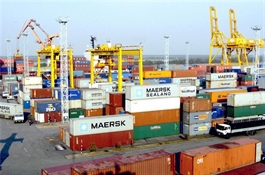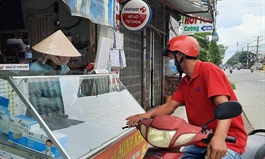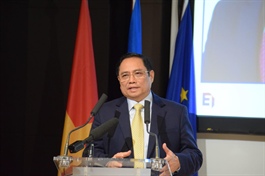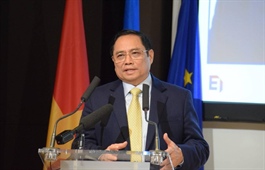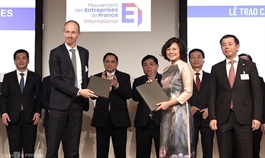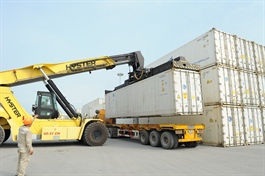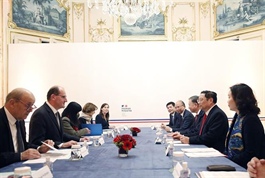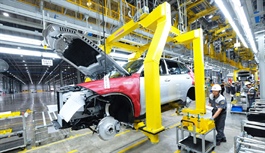EVFTA implementation creates momentum for Viet Nam-EU ties
EVFTA implementation creates momentum for Viet Nam-EU ties
The implementation of the EU-Viet Nam Free Trade Agreement (EVFTA) from August last year has created a new impetus for Viet Nam-EU relations.

The deal has opened up vast co-operation opportunities, promoted trade and investment connectivity for business community and citizens, said Deputy Foreign Minister Dang Hoang Giang at a seminar reviewing one year of EVFTA implementation.
The Ministry of Foreign Affairs co-ordinated with the Ministry of Industry and Trade to organise the seminar in Ha Noi on Thursday.
The total two-way turnover between Viet Nam and the EU reached US$41.29 billion in the first nine months of this year, up 13.4 per cent over the same period last year, of which, exports reached $28.85 billion, up 11.7 per cent.
The above result is very meaningful amid the COVID-19 pandemic, which has negatively affected economic and trade activities of countries.
Deputy Minister Dang Hoang Giang affirmed that the Ministry of Foreign Affairs and Viet Nam's diplomatic missions in the EU would continue to participate, contribute and accompany agencies and businesses in implementing the EVFTA and the country's integration strategy in the new period.
In the opening speech, Deputy Minister of Industry and Trade Tran Quoc Khanh also emphasised that the positive results after one year of implementing the EVFTA have met the expectations of the set trade turnover.
After a year, the export turnover of Viet Nam's goods to the EU market using the form of certificate of origin for the EU market reached a relatively high rate at nearly $8 billion, showing that many businesses have paid attention and made good use of tariff reduction incentives in the agreement.
An assessment of the Viet Nam Chamber of Commerce and Industry revealed that the level of understanding and expectations of enterprises for the EVFTA was relatively high compared with other FTAs which have been in effect.
Thirty per cent of surveyed enterprises closely understand information about EVFTA commitments compared to an average of 22.95 per cent in other FTAs.
Luong Hoang Thai, director of the Multilateral Trade Policy Department, Ministry of Industry and Trade, said that thanks to the EVFTA, two-way trade turnover between Viet Nam and the EU has grown in a more sustainable direction, both in terms of quality and quantity, with both exports and imports achieving positive results.
Agricultural products, textiles, and fishery are industries that have taken advantage of opportunities from the agreement, he said.
In addition to the opportunity to expand and diversify the market, the EVFTA also gives Viet Nam the opportunity to reform institutions, enhance transparency, improve the business and investment environment and transform the product structure towards the exports of high value-added products.
At the talks, ambassadors and trade counselors provided useful information about the market, consumption trends in some EU countries, and trade promotion events.
However, the fact that the competitiveness and level of deep participation in the value chain of Vietnamese enterprises are still limited; exports have not been combined with high-tech investment co-operation to produce and distribute products.
Representatives of enterprises suggested that management agencies continue to improve mechanisms and policies to support enterprises to improve their capacity, access information and preferential policies, and innovate production methods towards sustainability.
Companies also hoped that the representative agencies would strengthen the provision of information about the market, have a plan to co-ordinate in promoting the national brand image, and promote trade promotion activities synchronously in European regions.
Research on the one-year implementation of the Europe-Viet Nam Free Trade Agreement (EVFTA) was launched at a workshop in Ha Noi on Wednesday.
The study, entitled “One Year Implementation of EVFTA: Impacts on the Vietnamese Economy and Policy Formation", was implemented by the Viet Nam Institute for Economic and Policy Research (VEPR) with support of Konrad Adenauer Foundation (KAS) Viet Nam.
Along with bright spots during one year of the implementation of the agreement, in general, Vietnamese firms have still faced many difficulties in making full use of the deal.
Addressing the event, Associate Prof. Dr. Nguyen Anh Thu, VEPR Director, said that the legal system of Viet Nam was being changed positively to meet requirements of the deal.
However, Thu held that Viet Nam was facing many challenges from both inside and outside. She advised businesses to be more active to improve their capacity and products’ quality to deeper engage in the global supply chain.
Meanwhile, Pham Van Long, a representative from the research team said that among eight businesses involved in the research, only two said that they saw rises in export revenue from the EU thanks to increasing orders, and the remainder said that they suffered a reduction.
He said that the reasons behind the situation were tighter export conditions and higher logistics costs due to impacts of COVID-19.
In general, the EVFTA is one of the new generation FTAs that brings about strategic benefits to Viet Nam through the development of the promising trade and investment partnership with one of its biggest and most important partners.
Due to COVID-19, the effectiveness of the deal is remarkably restricted. One year since the deal become effective on August 1 last year, export value of goods might reach $51.04 billion, up 12.27 per cent in case of no COVID-19 and no tariff reduction, and 36.28 per cent compared to the same period in the previous year.
Participants at the event proposed a number of recommendations on the reform of administrative procedure to make more favourable conditions for businesses in taking advantages of the EVFTA.







